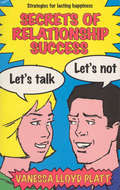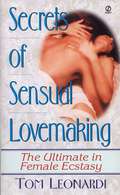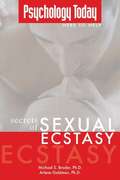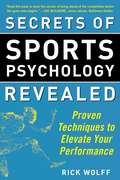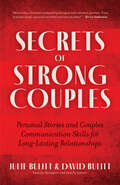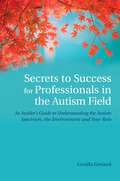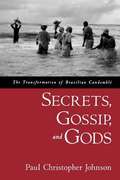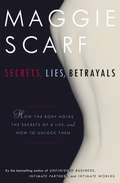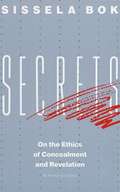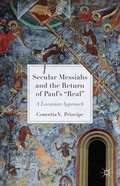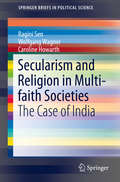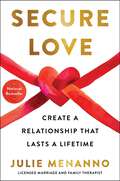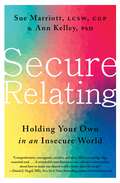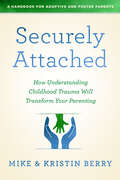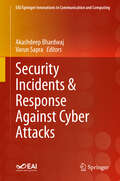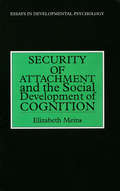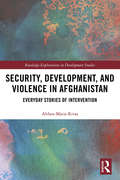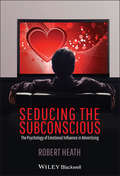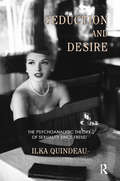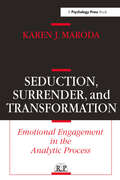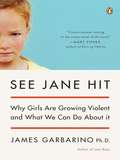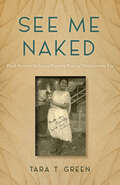- Table View
- List View
Secrets of Relationship Success
by Vanessa Lloyd PlattDivorce figures are at an all time high. In this provocative book Vanessa Lloyd Platt ponders who is to blame for this. Is it women who fail to balance work and home, turning it into a battle-ground, or men, who fail to help at home or communicate effectively? With quotes and anecdotes from both men and women Secrets of Relationship Success suggests how to reverse the bad habits which can destroy relationships, and provides tips and strategies for coping with adultery, stress, men's childishness and violence. By spotlighting these repeated behaviour patterns, Vanessa Lloyd Platt believes that relationships can be saved and set on the right path to lasting happiness.
Secrets of Sensual Lovemaking
by Tom Leonardi Arthur GrossSizzling with sensuality and expertise, this definitive guide shows you how to give the women in your life the best loving she's ever had. With surefire secrets to finding the elusive "G-Spot," and information on how to make monogamy and safe sex sexy, this one-of-a-kind book will make you wonder how you ever lived - and loved - without it! Compares to Naura Hayden's How to Satisfy a Woman Every Time and Brenda Venus's Secrets of Seduction. Also in the tradition of Graham Masterson's How to Drive Yor Woman Wild in Bed and Ellen Kreidman's Light Her Fire. Tom Leonardi is a noted sex columnist for P. O. V. magazine. With its tried and true technoques, Secrets of Sensual Lovemaking is one of the most essential and useful books of its kind on the market.
Secrets of Sexual Ecstasy
by Michael S. Broder Arlene GoldmanThis guide contains more up- to-date information from qualified sources than any other book-including such noted psychologists as Dr. Ruth Westheimer and Dr. Albert Ellis. Readers will discover how to optimize their sex life with the five ingredients of ultimate sexual satisfaction, attitudes and practices conducive to spectacular sex (and how to achieve them), strategies for overcoming obstacles to great sex, and how to train the brain to fall in love again.
Secrets of Sports Psychology Revealed: Proven Techniques to Elevate Your Performance
by Rick WolffThe world of sports psychology and in the introduction of mental skills coaches has exploded into the athletic mainstream over the last few decades. Before then, the attitude regarding such training was extremely conservative and “old school”—the prevailing philosophy was that “any athlete who needs to talk with a shrink needs to have their head examined.”Fortunately, with today’s modern athletes, the dark ages of mental training in sports have gone away and times have changed for the better. But as with any growing industry, there are lots of new and untested pathways to one’s mental performance training in practices and games. But depending on who you talk to, the advice that is given can vary widely—and sometimes, even be contradictory. The Secrets of Sports Psychology Revealed by Rick Wolff, one of the pioneers in the field of sports psychology, is based upon his many years of clinical, hands-on work with top professional and amateur athletes in a variety of sports. He provides real insight into what does—and doesn’t—work. Specifically:Do pre-game visualization techniques really work?Is it OK to be superstitious, or are those rituals counterproductive?Does taking a deep breath or two in a tight situation really help?What’s the best way to learn how to make adjustments in one’s game?These direct questions, and many others, are presented and answered in this easy to use how-to guide aimed directly at athletes and coaches. The answers are right to the point and are based upon the author’s observations and work over the years with top athletes.
Secrets of Strong Couples: Personal Stories and Couples Communication Skills for Long-Lasting Relationships
by David Bulitt Julie BulittKeep Your Marriage Strong“Written by a licensed relationship therapist and a divorce attorney, if you read this book, you won’t need the services of either! ” ―Becca Anderson, author of Let Me Count the Ways#1 New Release in Sociology of Marriage & FamilyCouples communication and relationship experts David Bulitt and Julie Bulitt share their relational knowledge in this book that may save your marriage. With stories and marriage help tested by real couples, learn how to survive and thrive after relationship and marriage fights, becoming parents, deaths, and other struggles.Get partnership and marriage help tested by real couples. The relationship experts behind the bestselling The Core Conversations for Couples put together another essential couples book for relationships. Secrets of Strong Couples shows you how real couples have made it through to the other side of real crises—together.Learn how to overcome couples communication hardships, marriage fights, and more. Walk alongside committed partners as you learn how to fix your marriage or relationship, no matter what life throws at you. Whether you’re dealing with infertility, job loss, infidelity, grief, or other relationship strife, these personal stories provide all the relationship and marriage advice you need to thrive!Inside this essential couples gift, you’ll find:Practical advice from authors experienced in couples, marriage counseling and divorce lawExamples of how to persevere through life’s most difficult trials without losing each otherReal couples communication help from partners who are not afraid to share their difficult storiesReaders of books like This Is How Your Marriage Ends by Matthew Fray, Marriage Be Hard by Kevin Fredericks & Melissa Fredericks, or Communication Miracles for Couples by Jonathan Robinson will love Secrets of Strong Couples.
Secrets to Success for Professionals in the Autism Field: An Insider's Guide to Understanding the Autism Spectrum, the Environment and Your Role
by Gunilla GerlandGunilla Gerland's extensive experience of the autism spectrum means she is expertly placed to offer a fresh perspective on working with autism as well as a wealth of effective tools and interventions to use in practice. In a highly readable style, with many inspiring examples, this book offers original explanations of the impairments associated with autism, showing how to discover the root cause of behaviours that are challenging, not just how to manage them superficially. It looks objectively and non-judgementally at the common pitfalls and difficulties that autism professionals may encounter, explaining how to deal with these and transition to more effective working relationships. An important section on ethics and reflection equips the reader with the knowledge and skills needed to grow professionally in the field. Packed with original insights and practical, hands-on tools and strategies, this is essential reading for teachers, teaching assistants, support workers, counsellors, social workers and anyone else working with individuals of any age on the autism spectrum.
Secrets to Success for Professionals in the Autism Field: An Insider's Guide to Understanding the Autism Spectrum, the Environment and Your Role
by Gunilla GerlandGunilla Gerland's extensive experience of the autism spectrum means she is expertly placed to offer a fresh perspective on working with autism as well as a wealth of effective tools and interventions to use in practice. In a highly readable style, with many inspiring examples, this book offers original explanations of the impairments associated with autism, showing how to discover the root cause of behaviours that are challenging, not just how to manage them superficially. It looks objectively and non-judgementally at the common pitfalls and difficulties that autism professionals may encounter, explaining how to deal with these and transition to more effective working relationships. An important section on ethics and reflection equips the reader with the knowledge and skills needed to grow professionally in the field. Packed with original insights and practical, hands-on tools and strategies, this is essential reading for teachers, teaching assistants, support workers, counsellors, social workers and anyone else working with individuals of any age on the autism spectrum.
Secrets, Gossip, and Gods: The Transformation of Brazilian Candomblé
by Paul Christopher JohnsonIn this wide-ranging book Paul Christopher Johnson explores the changing, hidden face of the Afro-Brazilian indigenous religion of Candombl . Despite its importance in Brazilian society, Candombl has received far less attention than its sister religions Vodou and Santeria. Johnson seeks to fill this void by offering a comprehensive look at the development, beliefs, and practices of Candombl and exploring its transformation from a secret society of slaves--hidden, persecuted, and marginalized--to a public religion that is very much a part of Brazilian culture. Johnson traces this historical shift and locates the turning point in the creation of Brazilian national identity and a public sphere in the first half of the twentieth century. His major focus is on the ritual practice of secrecy in Candombl . Like Vodou and Santeria and the African Yoruba religion from which they are descended, Candombl features a hierarchic series of initiations, with increasing access to secret knowledge at each level. As Johnson shows, the nature and uses of secrecy evolved with the religion. First, secrecy was essential to a society that had to remain hidden from authorities. Later, when Candombl became known and actively persecuted, its secrecy became a form of resistance as well as an exotic hidden power desired by elites. Finally, as Candombl became a public religion and a vital part of Brazilian culture, the debate increasingly turned away from the secrets themselves and toward their possessors. It is speech about secrets, and not the content of those secrets, that is now most important in building status, legitimacy and power in Candombl . Offering many first hand accounts of the rites and rituals of contemporary Candombl , this book provides insight into this influential but little-studied group, while at the same time making a valuable contribution to our understanding of the relationship between religion and society.
Secrets, Lies, Betrayals: The Body/Mind Connection
by Maggie ScarfReading Maggie Scarf’s groundbreaking new book could change your life. In Secrets, Lies, Betrayals, the bestselling author of Unfinished Business, Intimate Partners, and Intimate Worlds brilliantly explores how the body holds on to painful episodes from the past—including secrets we may be keeping even from ourselves—and how we can release them to live freer, healthier lives.The body has a unique memory system, in which early trauma and deeply buried feelings become woven into the fabric of our physical being. Certain events can trigger these body memories, which may then manifest themselves symptomatically—as persistent anger, mood swings, headaches, muscle tension, and fatigue. These echoes from the past also cause destructive patterns in our lives and relationships.Why does a beautiful, successful woman like Claudia seek out abusive, explosively tense relationships in which she is forced to hide the truth about herself? Why does the presence of a strange woman’s name in her husband’s cell phone directory make Karen feel physically ill, to the point where she cannot get through her daily life? And why does the author herself experience painful physical symptoms when she wrestles with contradictory memories of her mother? Exploring these and other personal narratives, Scarf reveals how the body, through its neurobiological systems, retains some of life’s most important experiences—and describes how new power therapies, such as reprocessing and psychomotor, have had immediate results where traditional therapies have had a lower success rate.Grounded in recent breakthroughs in mind/body science and drawing on Scarf’s personal experiences, this book is a masterpiece of research, analysis, and insight into the human psyche, and into human life.
Secrets: On the Ethics of Concealment and Revelation
by Sissela BokThe book shows how the ethical issues raised by secrets and secrecy in our careers or private lives take us to the heart of the critical questions of private and public morality.
Secular Messiahs and the Return of Paul’s "Real"
by Concetta V. PrincipeConsidering that secularism was designed to erase the influence of religion from the public sphere, the use of the messiah in secular texts begs the question: Why does the religious trope recur? Following from this point of inquiry, this book posits that the messiah in secularism can be understood as the 'return of the repressed' and, as such, may be read as symptomatic of trauma. According to psychoanalyst Jacques Lacan, trauma indicates the 'encounter with the Real', where the 'Real' is so inexplicable that it is visible only in what returns to haunt the subject: the objet a. But if the messiah may be seen as the objet a, then what is the source of this traumatic return? Principe engages with the limitations of answering this question with the aim of circumscribing a field of exploration: is there a relation between the modern use of the messiah and the earliest witness to the term in Paul's letters of his encounter with Christ? And what is the relation between Paul's Christianity and secularism? In other words, what of Paul's 'Real' returns in the twentieth century?
Secularism and Religion in Multi-faith Societies
by Ragini Sen Wolfgang Wagner Caroline HowarthThis Brief looks at the illustrative case of the Hindu-Muslim conflict in India, with the aim of understanding the dynamics of lived secularism as it exists in traditional multi-faith societies such as India. The data analyzed in this Brief comprise many interviews, conducted amidst Hindus and Muslims, with respondents of both sexes living in slum and middle class regions in the city of Mumbai. The volume begins by giving a brief summary of the historical and cultural background to the present situation in India. It then traces complementarities and similarities of opinions across diverse constituencies which cluster around three main anchoring points: communication, re-presentations and operationalizing of a shared dream. The first point explores the need to understand and to be understood, encourages processes of mutual acculturation, and describes the sensitive decoding of cultural symbols such as dress codes. The second point discusses changes in mind sets and mutual perceptions, where Muslims and Islam are portrayed in a balanced way and exploitation of religion for political purposes is stopped. The third main point is the involvement of the common, regular person, and a focus on children, as the unifying hope for the future. Throughout the volume, emphasis is on moral maturation, cultural interpretation in lieu of cultural imposition and creation of a sensitive media policy. The issues raised may help craft interdisciplinary and international frameworks, which address conflict resolution in culturally diverse multi-faith societies. Accordingly, the book concludes with policy recommendations for supporting the peaceful coexistence of secularism and religion in society from a peace psychological perspective.
Secure Love: Create a Relationship That Lasts a Lifetime
by Julie MenannoCreate a lasting and loving attachment with the help of the expert couple&’s therapist behind the popular Instagram account @TheSecureRelationship.What does a healthy relationship look like? A good question, in theory, but expert couple&’s therapist Julie Menanno wants you to consider: what does a securely attached relationship feel like? The answer to this question is the ultimate goal in Secure Love, a groundbreaking guide to understanding secure attachment in adult relationships. While attachment theory has grown in popularity to explain the relationship between children and their caregivers, it&’s also the closest science has come to making sense of our adult romantic connections. Julie Menanno is the couple&’s therapist behind the popular Instagram account @TheSecureRelationship, whose valuable relationship advice from her expertise gained her over a million fans. In Secure Love, Menanno tackles: - Why you and your partner have the same fight over and over (hint: it&’s called a negative cycle, and underlying every fight, argument, silent treatment, or passive-aggressive comment is an unmet attachment need). - The four attachment types, with exercises designed to help you understand you and your partner&’s attachment style. - How to improve communication, including staying connected during conflict by prioritizing vulnerability rather than protecting yourself. - &“Instead of that, say this&” suggested scripts of how to approach difficult situations in your relationship. - Why insecure attachment negatively impacts a couple&’s sex life and how to restore that sexual connection. Secure Love is a crash course in understanding how you show up in a relationship and how to get out of negative cycles. Menanno teaches you how to establish a secure attachment with your partner to create the bond you&’ve been longing for.
Secure Relating: Holding Your Own in an Insecure World
by Ann Kelley Sue MarriottExperienced mental health professionals and hosts of the Therapist Uncensored podcast offer a groundbreaking new clinical perspective that integrates modern attachment theory, relational neuroscience, and current cultural context to create a hopeful framework for deeper and more permanent change, growth and connection in all types of relationships.Secure Relating offers a refreshing and innovative approach to understanding and improving relationships in today's increasingly polarized world. Drawing on over thirty years of professional clinical experience, authors Ann Kelley, PhD and Sue Marriott, LCSW, CGP integrate modern attachment theory, relational neuroscience, and depth psychology into practical tools for deepening self-awareness and navigating closeness with strength in even the most challenging relationships.Instead of the popular broad attachment categorizations, Secure Relating presents a nuanced understanding of attachment and interpersonal defensive patterns, allowing readers to delve into the complexities of their own experience and apply the specific skills they need.Refreshingly, Kelley and Marriott make complex concepts accessible and relatable, emphasizing the realistic capacity for neural change and psychological growth. They provide contemporary concepts and interactive tools such as the Modern Attachment Regulation Spectrum, a new framework that helps readers identify their unconscious defensive patterns, update and revise their personal narratives, and cultivate a secure state of mind amid chaos and adversity. Secure Relating delivers hope, connection, and empowerment amidst the many barriers to emotional closeness and provocations towards self-protection by offering a comprehensive approach to understanding and transforming all kinds of relationships into more secure and satisfying bonds.
Securely Attached: How Understanding Childhood Trauma Will Transform Your Parenting- A Handbook for Adoptive and Foster Parents
by Kristin Berry Mike BerryHas Trauma Affected the Child You&’re Caring For?Just as you prepared your home to welcome a new child, it is important to prepare your heart and mind—especially if the child has suffered from a background of trauma. Perhaps your invitation for love is met with hostility, and you find that this new member of your family rejects connection. If so, then it&’s critical to acknowledge the effects of trauma on a child&’s ability to attach.Mike and Kristin Berry realized this when they became adoptive and foster parents. In their twenty-year marriage, they have had the joy of adopting eight children and fostering twenty-three. They now offer guidance from their own journey to others parenting a child who has experienced past trauma. In Securely Attached, they offer practical insights that are supported by therapeutic and medical facts, so all parents can provide best for the children in their care. You&’ll learn:How trauma changes the brainHow to identify trauma-induced behaviorsHow to identify attachment disordersHow to advocate for your child in the community.Get the help you need to better care for the children in your home. Discover how you can create a family and home that is safe and supportive so your children can grow to trust and become securely attached.
Securely Attached: How Understanding Childhood Trauma Will Transform Your Parenting- A Handbook for Adoptive and Foster Parents
by Kristin Berry Mike BerryHas Trauma Affected the Child You&’re Caring For?Just as you prepared your home to welcome a new child, it is important to prepare your heart and mind—especially if the child has suffered from a background of trauma. Perhaps your invitation for love is met with hostility, and you find that this new member of your family rejects connection. If so, then it&’s critical to acknowledge the effects of trauma on a child&’s ability to attach.Mike and Kristin Berry realized this when they became adoptive and foster parents. In their twenty-year marriage, they have had the joy of adopting eight children and fostering twenty-three. They now offer guidance from their own journey to others parenting a child who has experienced past trauma. In Securely Attached, they offer practical insights that are supported by therapeutic and medical facts, so all parents can provide best for the children in their care. You&’ll learn:How trauma changes the brainHow to identify trauma-induced behaviorsHow to identify attachment disordersHow to advocate for your child in the community.Get the help you need to better care for the children in your home. Discover how you can create a family and home that is safe and supportive so your children can grow to trust and become securely attached.
Security Incidents & Response Against Cyber Attacks (EAI/Springer Innovations in Communication and Computing)
by Akashdeep Bhardwaj Varun SapraThis book provides use case scenarios of machine learning, artificial intelligence, and real-time domains to supplement cyber security operations and proactively predict attacks and preempt cyber incidents. The authors discuss cybersecurity incident planning, starting from a draft response plan, to assigning responsibilities, to use of external experts, to equipping organization teams to address incidents, to preparing communication strategy and cyber insurance. They also discuss classifications and methods to detect cybersecurity incidents, how to organize the incident response team, how to conduct situational awareness, how to contain and eradicate incidents, and how to cleanup and recover. The book shares real-world experiences and knowledge from authors from academia and industry.
Security of Attachment and the Social Development of Cognition (Essays in Developmental Psychology)
by Elizabeth MeinsSecurity of Attachment and the Social Development of Cognition investigates how children's security of attachment in infancy is related to various aspects of their cognitive development over the preschool years. The book thus constitutes an ambitious attempt to build bridges between the domains of social and cognitive development, and as such addresses issues which are of increasing interest to developmental psychologists. In the first two chapters, Meins outlines Bowlby's attachment theory and the research which it has inspired, and develops the theme of a secure attachment relationship providing children with a sense of themselves as effective agents in their interactions with the world (self-efficacy).The next five chapters describe a longitudinal study of a sample of children whose security of attachment was assessed in infancy. Security-related differences are reported in the areas of object/person permanence, language acquisition, symbolic play, maternal tutoring and theory of mind, but no differences were found in general cognitive ability. Meins argues that the wide-ranging advantages enjoyed by the securely attached children are best explained in terms of their greater self-efficacy and social flexibility, nurtured by a particular kind of early infant-mother interaction.This book's major contribution is in its approach to explaining why securely attached children may be more self-effective and flexible in social interactions. Meins attempts to account for these differences within a Vygotskian framework, focusing on the secure dyad's greater ability to function within the zone of proximal development. She suggests that a mother's mind-mindedness (the propensity to treat one's infant as an individual with a mind) is an important factor in determining her ability to interact sensitively with her child. In the final chapter, Meins considers how the Vygotskian approach can complement and extend existing theories of attachment, and suggests some ways in which future research might address outstanding questions in this rapidly advancing field.
Security, Development, and Violence in Afghanistan: Everyday Stories of Intervention (Routledge Explorations in Development Studies)
by Althea-Maria RivasSecurity, Development, and Violence in Afghanistan provides a unique insight into the lived realities of the international intervention in Afghanistan and highlights the diversity, relationships, and interdependence of various groups including both external actors and Afghan communities. Analysis of the international intervention in Afghanistan following the post 9/11 invasion in 2001, one of the largest and most expensive in history, tends to focus on the perspective of organisational dynamics and policies or external actors. Drawing on the author’s five years of experience living, researching and working in Afghanistan, this book uses ethnographic methodologies to explore the micro-level interactions between different actors, showing how communities, local leaders, aid workers, UN officials, military and others navigated shifting security, development, and conflict dynamics. Starting with a contextual introduction to the intervention and the key debates surrounding it, this book goes on to explore the stories of security, development, and violence as constructed through official policy discourse, and then through the lived experiences of interveners and local actors. The book weaves a compelling narrative which links local and global issues and focuses on the everyday practices, relationships and acts of resistance which take place in two provinces of Afghanistan. Finally, the author highlights what this book’s findings mean both for what we know about Afghanistan and for how we understand international interventions and the everyday dynamics between actors who live and work in spaces of conflict. Security, Development, and Violence in Afghanistan: Everyday Stories of Intervention will be of considerable interest to scholars and professionals with an interest in Afghanistan, aid work, humanitarian intervention, development studies, and peace and conflict studies.
Seducing the Subconscious
by Robert HeathOur relationship with ads: it's complicatedA must-read for anyone intrigued by the role and influence of the ad world, Seducing the Subconscious explores the complexities of our relationship to advertising. Robert Heath uses approaches from experimental psychology and cognitive neuroscience to outline his theory of the subconscious influence of advertising in its audience's lives. In addition to looking at ads' influence on consumers, Heath also addresses how advertising is evolving, noting especially the ethical implications of its development. Supported by current research, Seducing the Subconscious shows us just how strange and complicated our relationship is with the ads we see every day.
Seduction and Desire: The Psychoanalytic Theory of Sexuality Since Freud
by Ilka QuindeauModern society has introduced many new relationships and family forms and the pluralisation of sexual lifestyles in the hundred years since Freud. This book provides a systematic account of the current state of theory, developing a gender-wide model of human sexuality and outlining the implications of this for psychotherapy practice. The author argues that the development of human sexuality follows no innate biological programs, but takes place in an interpersonal relationship, often established in the early parent-child relationship. Whereas the current psychoanalytic discourse emanates from a rather rigid division of gender relations emphasizing the differences between men and women, the author develops a gender-wide model of human sexuality in which the 'masculine' and 'feminine' are integrated and contribute to the full diversity of gender identities and sexual varieties. She points to structural similarities of hetero-and homosexuality and perversion and calls for a general human sexuality that is based less on differences between men and women than with each other.
Seduction, Surrender, and Transformation: Emotional Engagement in the Analytic Process (Relational Perspectives Book Series #13)
by Karen J. MarodaSeduction, Surrender, and Transformation demonstrates how interpersonal psychoanalysis obliges analysts to engage their patients with genuine emotional responsiveness, so that not only the patient but the analyst too is open to ongoing transformation through the analytic experience. In so doing, the analyst moves from the position of an "interpreting observer" to that of an "active participant and facilitator" whose affective communications enable the patient to acquire basic self-trust along with self-knowledge. Drawing on the current literature on affect, Maroda argues that psychological change occurs through affect-laden interpersonal processes. Given that most patients in psychotherapy have problems with affect management, the completing of cycles of affective communication between therapist and patient becomes a vitally important aspect of the therapeutic enterprise. Through emotionally open responses to their patients and careful use of patient-prompted self-disclosures, analysts can facilitate affect regulation responsibly and constructively, with the emphasis always remaining on the patients' experience. Moments of mutual surrender - the honest emotional giving over of patient to analyst and analyst to patient - epitomize the emotionally intense interpersonal experiences that lead to enduring intrapsychic change. Maroda's work is profoundly personal. She does not hesitate to share with the reader how her own personality affects her thinking and her work. Indeed, she believes her theoretical and clinical preferences are emblematic of the way in which the analyst's subjectivity necessarily shapes theory choice and practice preferences in general. Seduction, Surrender, and Transfomation is not only a powerful brief for emotional honesty in the analytic relationship but also a model of the personal openness that, according to Maroda, psychoanalysis demands of all its practitioners.
See Jane Hit
by James GarbarinoFrom one of America's leading authorities on juvenile violence comes a groundbreaking investigation of the explosion of violent behavior in girls With Lost Boys, James Garbarino became our foremost explicator of violent behavior in boys. Now he turns his attention to its increasing incidence in girls. Twenty-five years ago, ten boys were arrested for assault for every one girl. Now that ratio is four-to-one and dropping. Combining clinical experience with incisive analyses of social trends, Garbarino traces the factors--many of them essentially positive--behind the epidemic: girls' increased participation in sports and greater comfort with their physicality, but also their lack of training in handling aggression. See Jane Hit goes beyond diagnosing the problem to outline a clear-eyed, compassionate solution.
See Me Naked: Black Women Defining Pleasure in the Interwar Era
by Tara T. GreenPleasure refers to the freedom to pursue a desire, deliberately sought in order to satisfy the self. Putting pleasure first is liberating. During their extraordinary lives, Lena Horne, Moms Mabley, Yolande DuBois, and Memphis Minnie enjoyed pleasure as they gave pleasure to both those in their lives and to the public at large. They were Black women who, despite their public profiles, whether through Black society or through the world of entertainment, discovered ways to enjoy pleasure.They left home, undertook careers they loved, and did what they wanted, despite perhaps not meeting the standards for respectability in the interwar era. See Me Naked looks at these women as representative of other Black women of the time, who were watched, criticized, and judged by their families, peers, and, in some cases, the government, yet still managed to enjoy themselves. Among the voyeurs of Black women was Langston Hughes, whose novel Not Without Laughter was clearly a work of fiction inspired by women he observed in public and knew personally, including Black clubwomen, blues performers, and his mother. How did these complicated women wrest loose from the voyeurs to define their own sense of themselves? At very young ages, they found and celebrated aspects of themselves. Using examples from these women’s lives, Green explores their challenges and achievements.
See Me Naked: Stories of Sexual Exile in American Christianity
by Amy FrykholmSee Me Naked takes us deep into the complex, intimate intersection of sexuality and spirituality. Telling the stories of nine ordinary people and the religious worlds they were raised in, Amy Frykholm takes us beyond the shockingly regular headlines of sexual scandal in the church to ask how Christian cultures in America affect our sexuality. A man named Matthew shows the intricate relation between his religious faith and his sexual addiction; another man defines religion as a wall that kept him from the discovery that he was gay, while a young woman uses sex to defy her devout parents. Many of these stories diagnose a troubled culture of religion and sex, but Frykholm's point is not to indict Christianity. Instead the book points toward how American Christians might make better use of their tradition to heal the divide between religion and sexuality. Nearly everyone interviewed for the book remains a Christian, yet each has undergone significant transformation to reach reconciliation.
